Dutt Lab in News
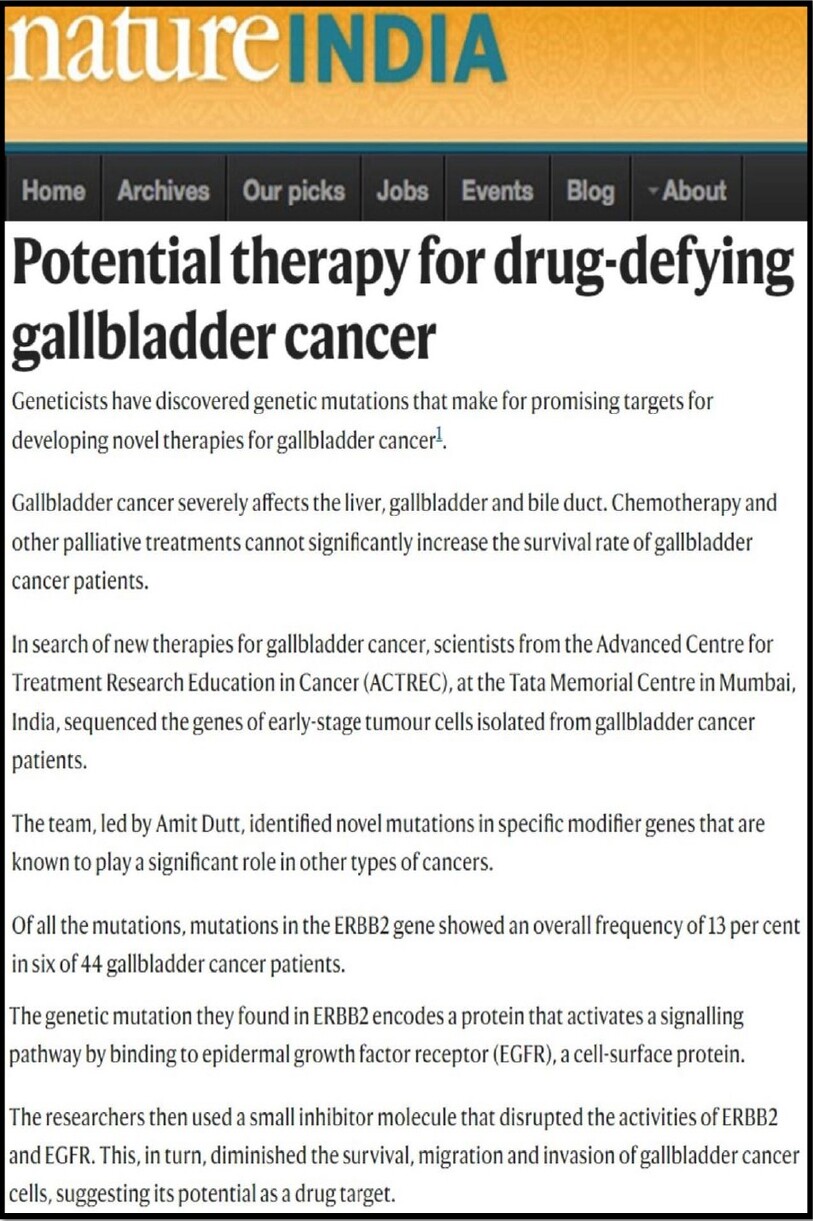 |
Potential therapy for drug-defying gallbladder cancer Geneticists have discovered genetic mutations that make for promising targets for developing novel therapies for gallbladder cancer1. Gallbladder cancer severely affects the liver, gallbladder and bile duct. Chemotherapy and other palliative treatments cannot significantly increase the survival rate of gallbladder cancer patients. In search of new therapies for gallbladder cancer, scientists from the Advanced Centre for Treatment Research Education in Cancer (ACTREC), at the Tata Memorial Centre in Mumbai, India, sequenced the genes of early-stage tumour cells isolated from gallbladder cancer patients. |
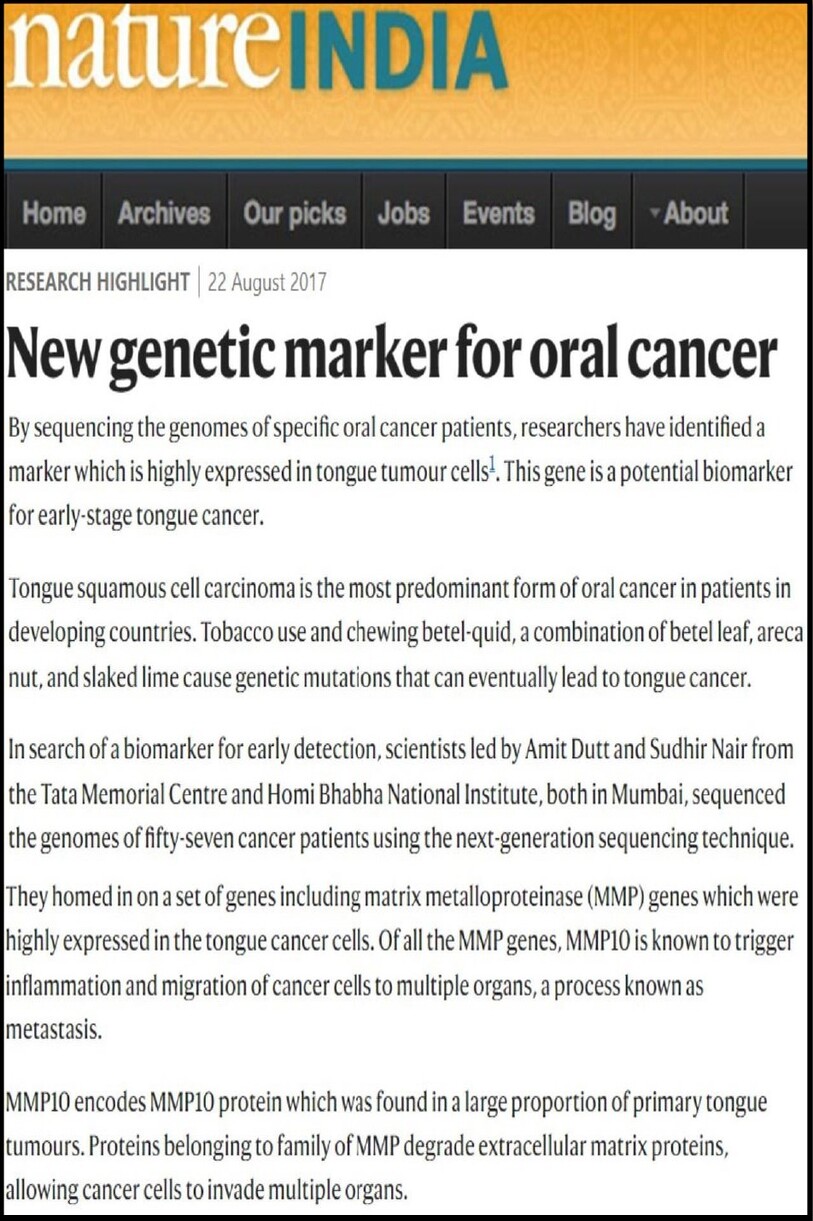 |
New genetic marker for oral cancer By sequencing the genomes of specific oral cancer patients, researchers have identified a marker which is highly expressed in tongue tumour cells1. This gene is a potential biomarker for early-stage tongue cancer. Tongue squamous cell carcinoma is the most predominant form of oral cancer in patients in developing countries. Tobacco use and chewing betel-quid, a combination of betel leaf, areca nut, and slaked lime cause genetic mutations that can eventually lead to tongue cancer. In search of a biomarker for early detection, scientists led by Amit Dutt and Sudhir Nair from the Tata Memorial Centre and Homi Bhabha National Institute, both in Mumbai, sequenced the genomes of fifty-seven cancer patients using the next-generation sequencing technique. |
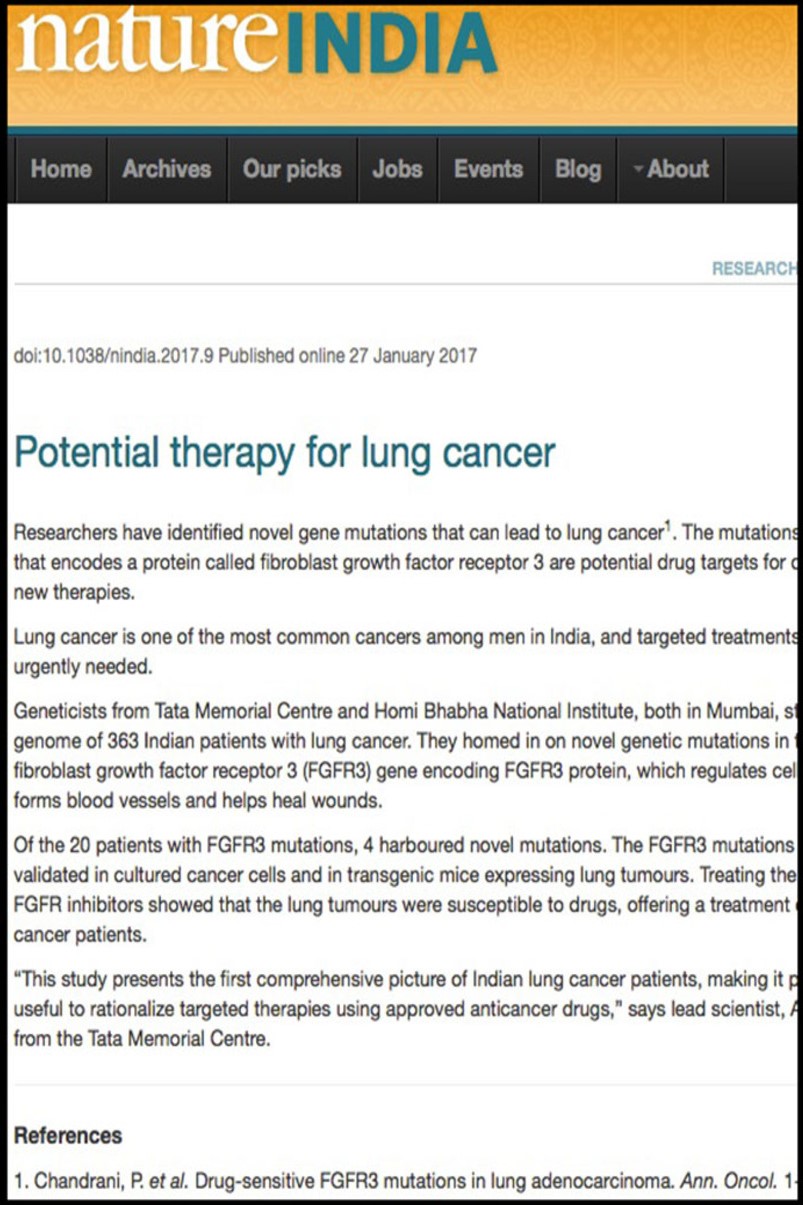 |
Potential therapy for lung cancer Researchers have identified novel gene mutations that can lead to lung cancer1. The mutations in a gene that encodes a protein called fibroblast growth factor receptor 3 are potential drug targets for developing new therapies. Lung cancer is one of the most common cancers among men in India, and targeted treatments are urgently needed. Geneticists from Tata Memorial Centre and Homi Bhabha National Institute, both in Mumbai, studied the genome of 363 Indian patients with lung cancer. They homed in on novel genetic mutations in the fibroblast growth factor receptor 3 (FGFR3) gene encoding FGFR3 protein, which regulates cell growth, forms blood vessels and helps heal wounds.. |
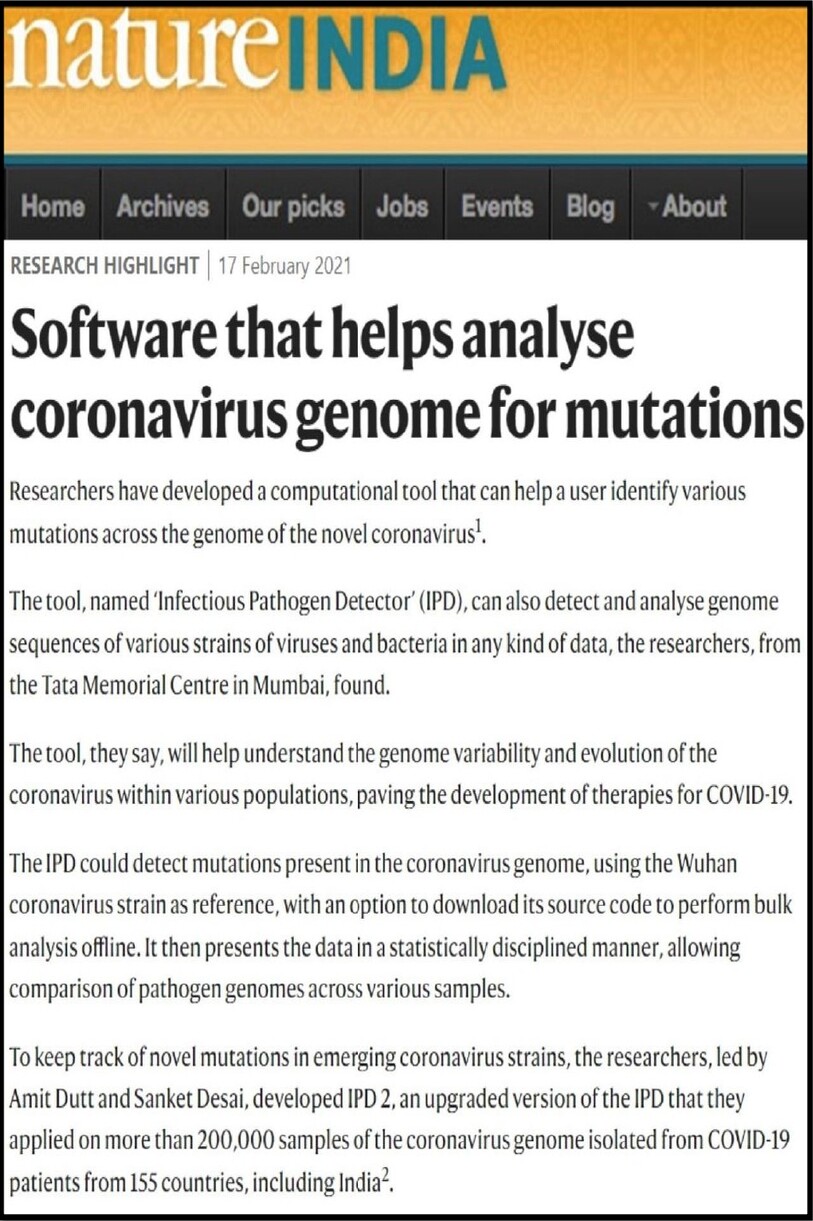 |
Software that helps analyse coronavirus genome for mutations Researchers have developed a computational tool that can help a user identify various mutations across the genome of the novel coronavirus1. The tool, named ‘Infectious Pathogen Detector’ (IPD), can also detect and analyse genome sequences of various strains of viruses and bacteria in any kind of data, the researchers, from the Tata Memorial Centre in Mumbai, found. The tool, they say, will help understand the genome variability and evolution of the coronavirus within various populations, paving the development of therapies for COVID-19. |
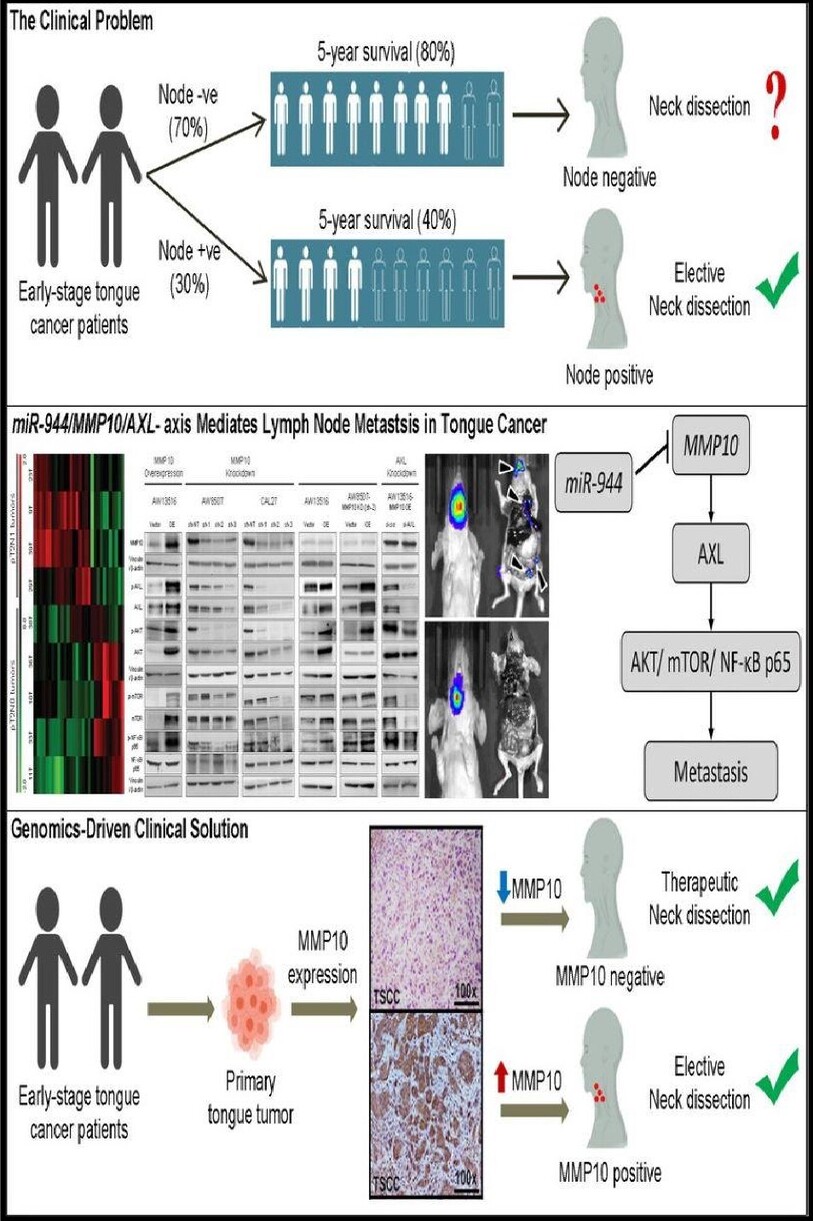 |
miR-944/MMP10/ AXL- axis Predict Metastasis in Tongue Cancer Oral cancer, also known as mouth cancer, can occur in any part of the mouth, including the lips, tongue, gums, and cheek lining. Depending on the stage and location of cancer, treatment options for oral cancer may include surgery, radiation therapy, chemotherapy, and targeted therapy. |
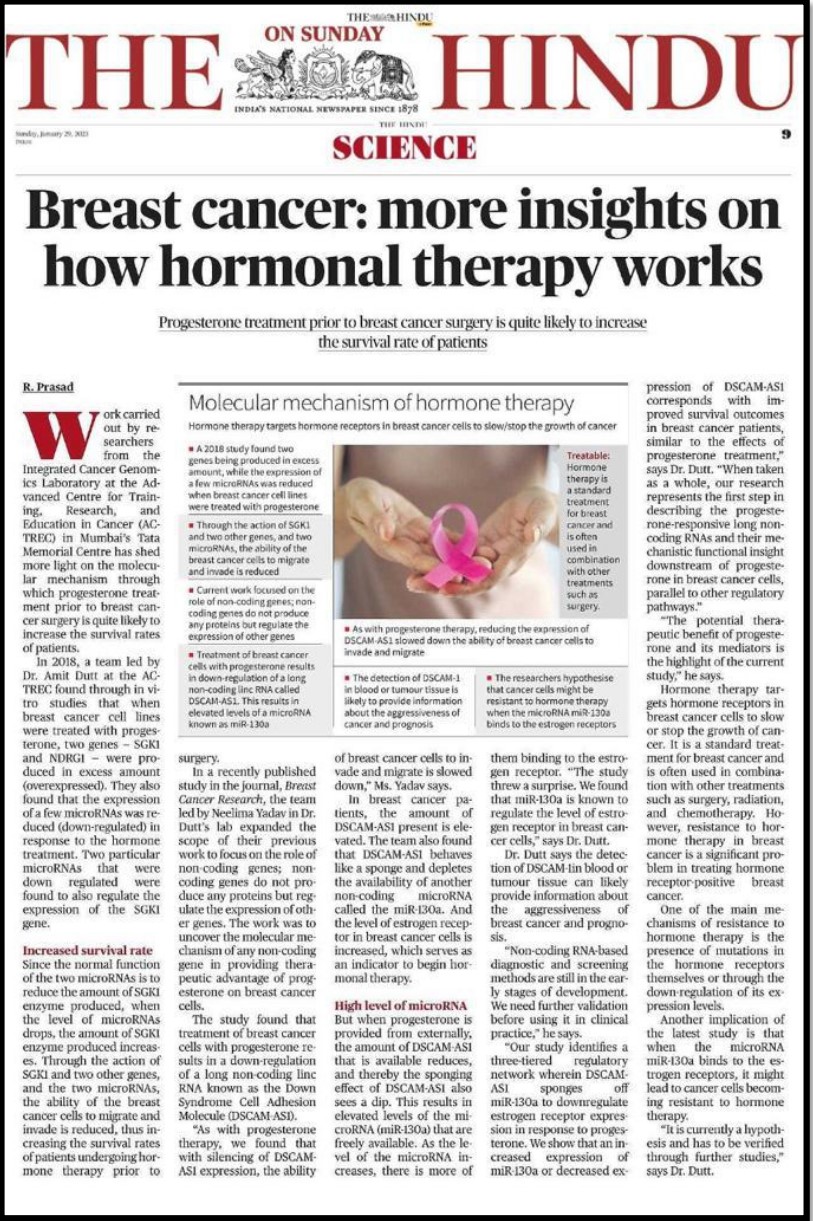 |
Breast cancer: more insights on how hormonal therapy works Work carried out by researchers from the Integrated Cancer Genomics Laboratory at the Advanced Centre for Training, Research, and Education in Cancer (ACTREC) in Mumbai’s Tata Memorial Centre has shed more light on the molecular mechanism through which progesterone treatment prior to breast cancer surgery is quite likely to increase the survival rates of patients. |
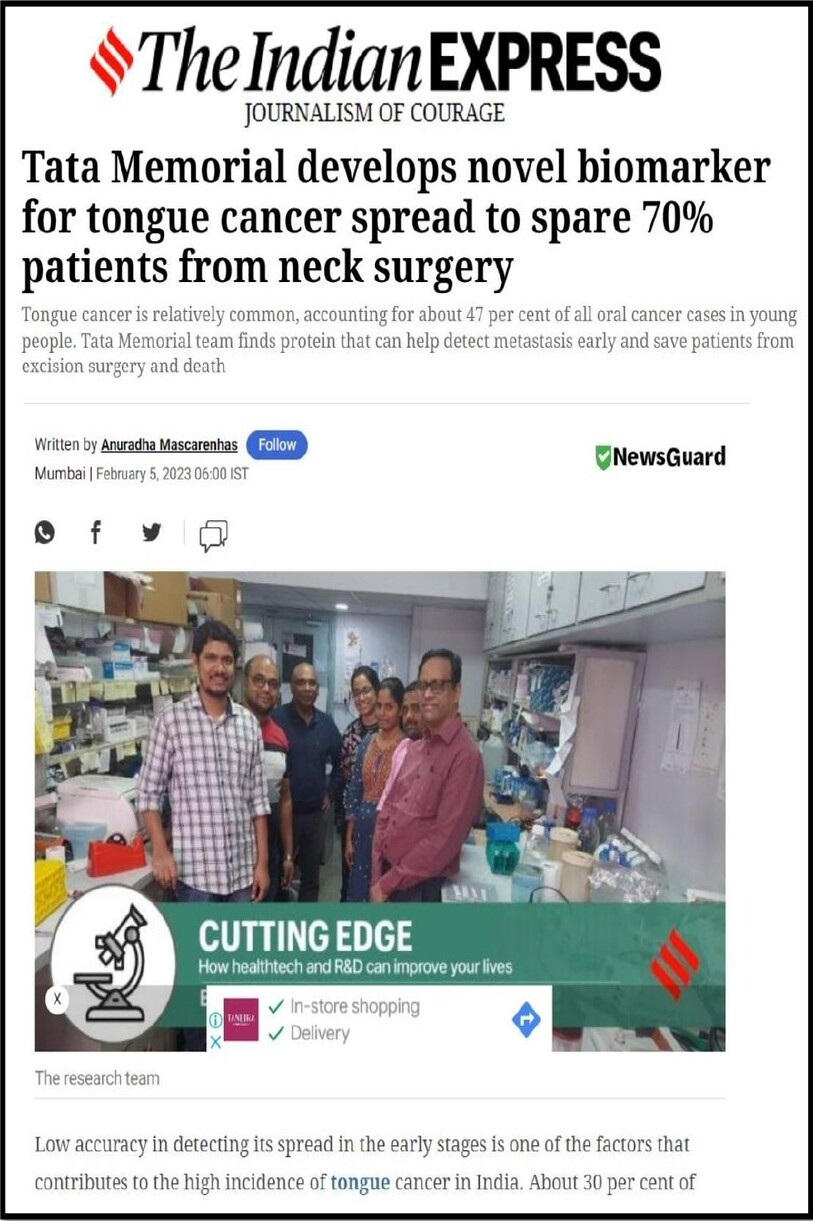 |
Tata Memorial develops novel biomarker for tongue cancer spread to spare 70% patients from neck surgery Low accuracy in detecting its spread in the early stages is one of the factors that contributes to the high incidence of tongue cancer in India. About 30 per cent of tongue cancer patients develop occult (hidden) metastases or a subclinical disease spread to surrounding lymph nodes. |
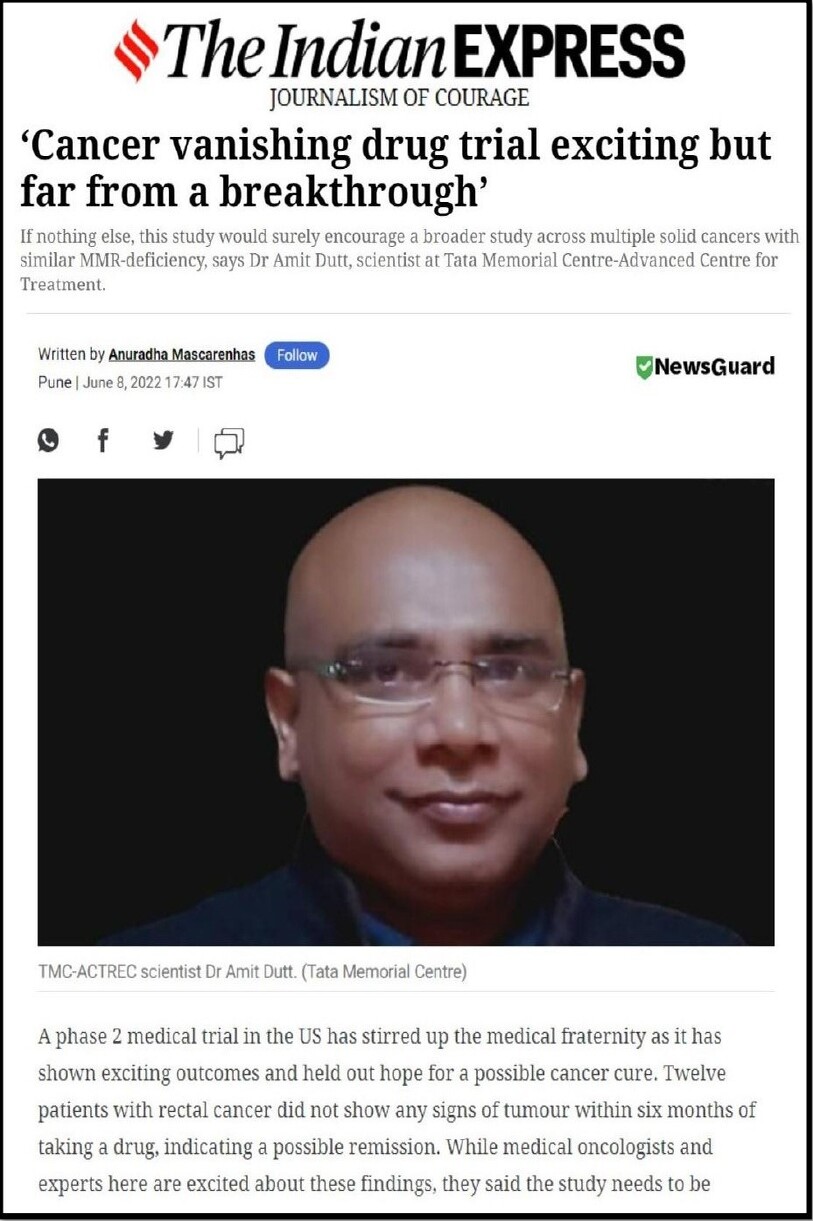 |
‘Cancer vanishing drug trial exciting but far from a breakthrough’ A phase 2 medical trial in the US has stirred up the medical fraternity as it has shown exciting outcomes and held out hope for a possible cancer cure. Twelve patients with rectal cancer did not show any signs of tumour within six months of taking a drug, indicating a possible remission. |
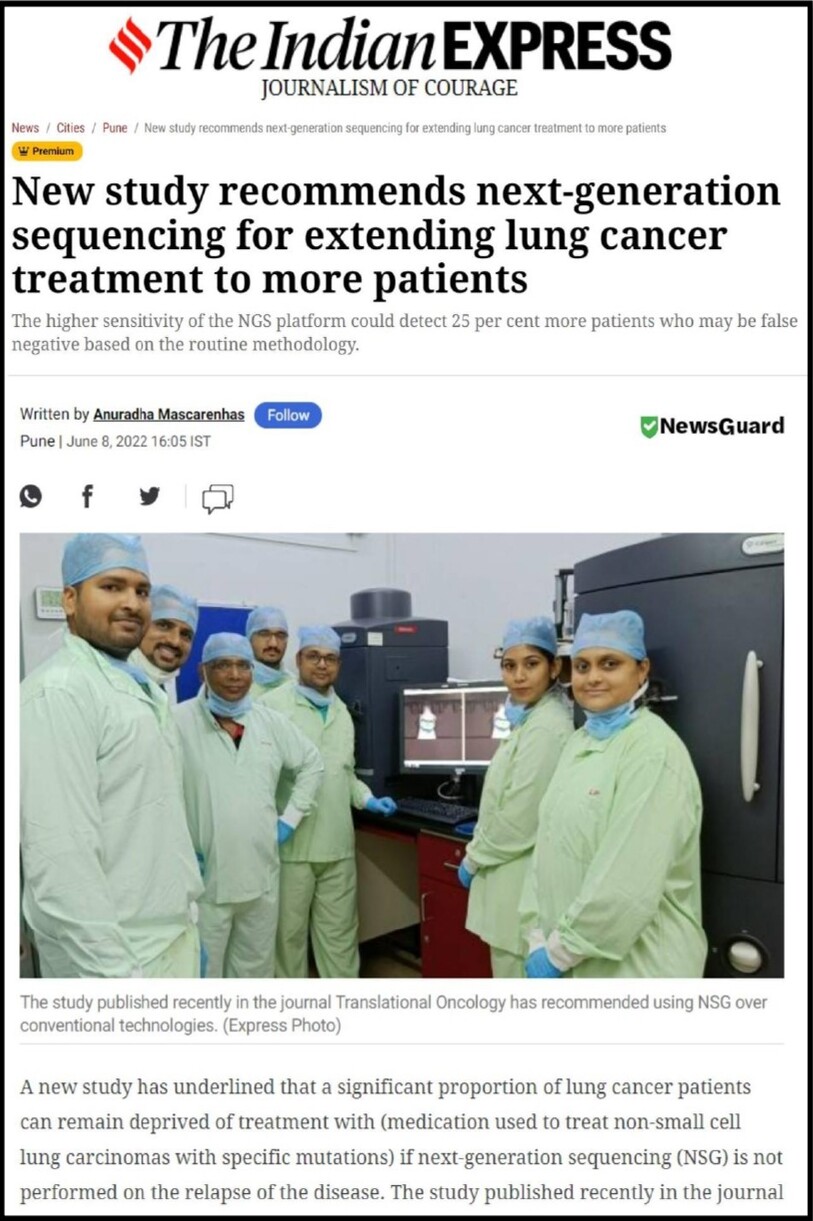 |
New study recommends next-generation sequencing for extending lung cancer treatment to more patients A new study has underlined that a significant proportion of lung cancer patients can remain deprived of treatment with (medication used to treat non-small cell lung carcinomas with specific mutations) if next-generation sequencing (NSG) is not performed on the relapse of the disease. |
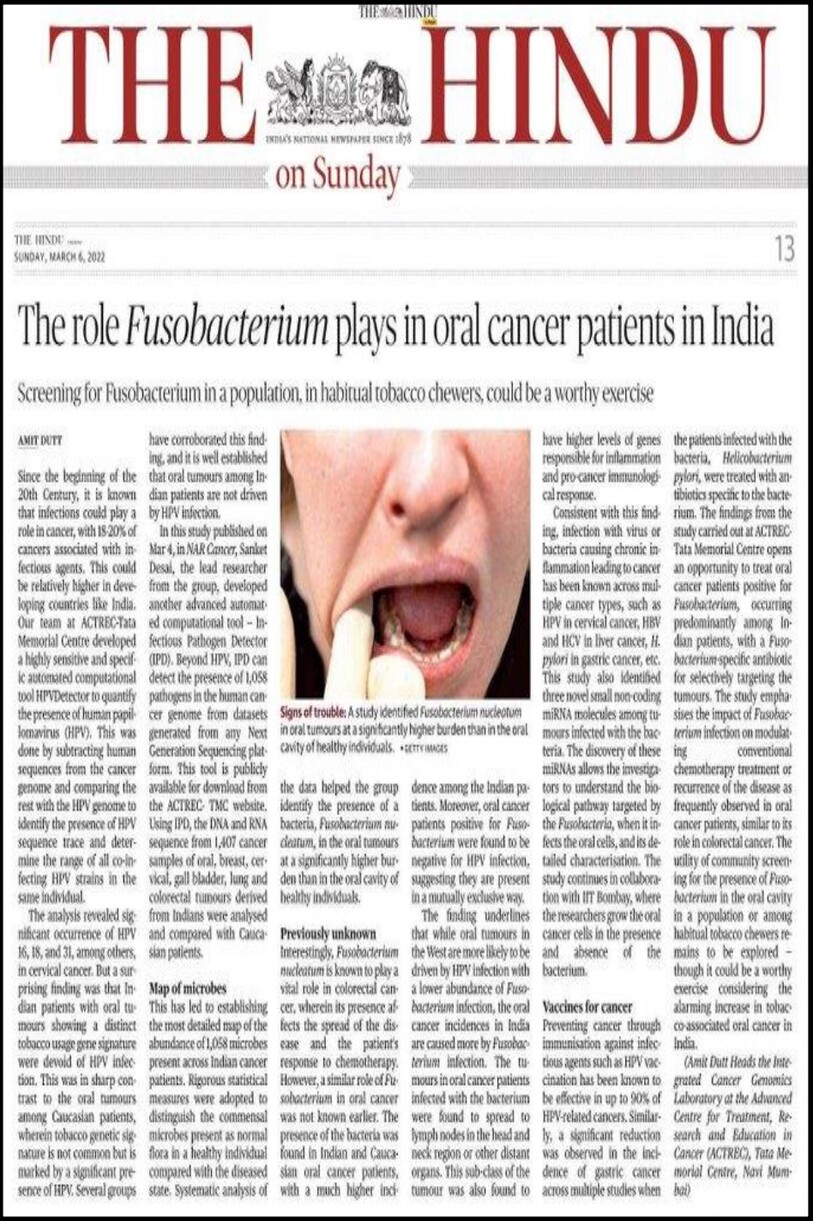 |
The role Fusobacterium plays in oral cancer patients in India Since the beginning of the 20th Century, it is known that infections could play a role in cancer, with 18-20% of cancers associated with infectious agents. This could be relatively higher in developing countries like India. Our team at ACTREC-Tata Memorial Centre developed a highly sensitive and specific automated computational tool HPVDetector to quantify the presence of human papillomavirus (HPV). This was done by subtracting human sequences from the cancer genome and comparing the rest with the HPV genome to identify the presence of HPV sequence trace and determine the range of all co-infecting HPV strains in the same individual. |
 |
Precision Oncology Company 4baseCare launches one-of-its-kind Indian Population Specific Cancer Gene Panel Bangalore (Karnataka) [India], August 18 (ANI/NewsVoir): 4baseCare, a precision oncology company in India, launched their product - TARGT Indiegene, India's largest and first population-specific tumour gene panel derived from Whole Exome and Whole Transcriptome data of over 1,500 cancer patients across 28 different cancer types. Most of the patients were presented with stage III/IV disease, and presented with disease progression and had exhausted all the options in the standard of care. |
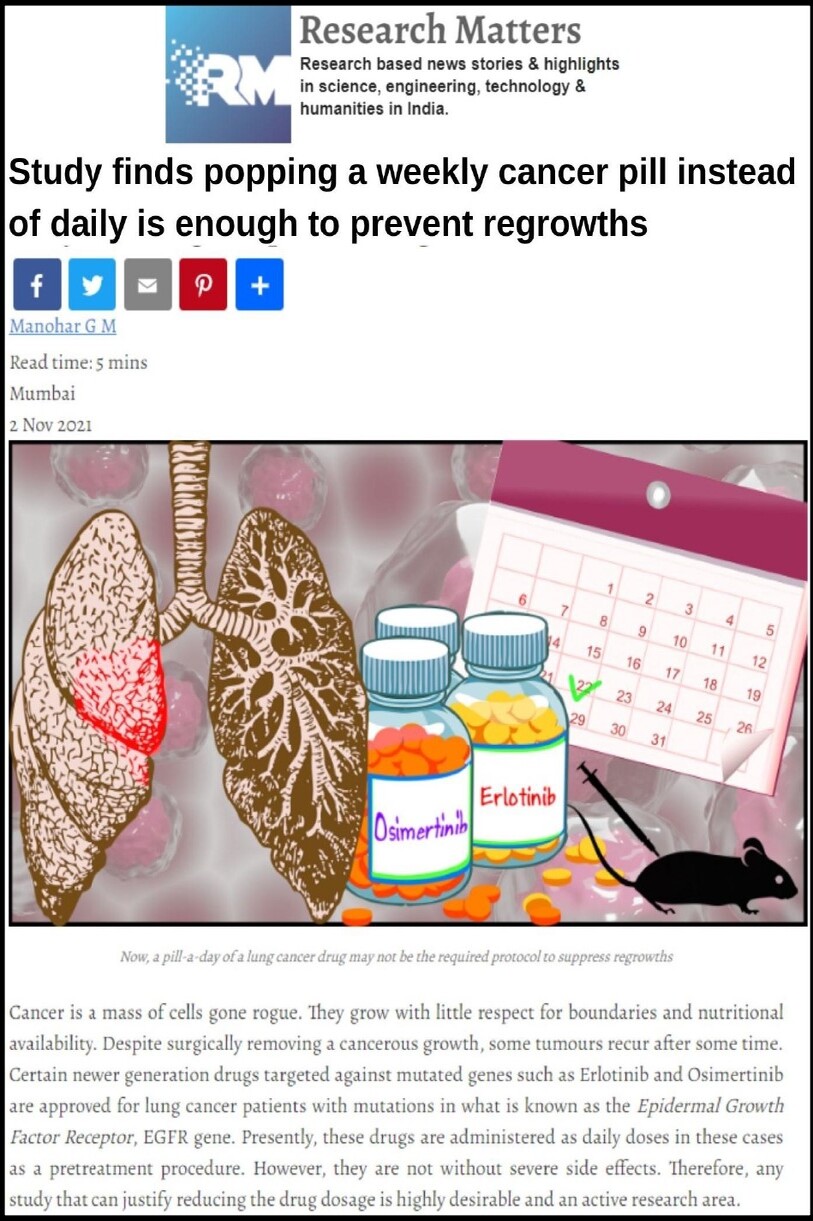 |
Study finds popping a weekly cancer pill instead of daily is enough to prevent regrowths Cancer is a mass of cells gone rogue. They grow with little respect for boundaries and nutritional availability. Despite surgically removing a cancerous growth, some tumours recur after some time. Certain newer generation drugs targeted against mutated genes such as Erlotinib and Osimertinib are approved for lung cancer patients with mutations in what is known as the Epidermal Growth Factor Receptor, EGFR gene. Presently, these drugs are administered as daily doses in these cases as a pretreatment procedure. However, they are not without severe side effects. Therefore, any study that can justify reducing the drug dosage is highly desirable and an active research area. |
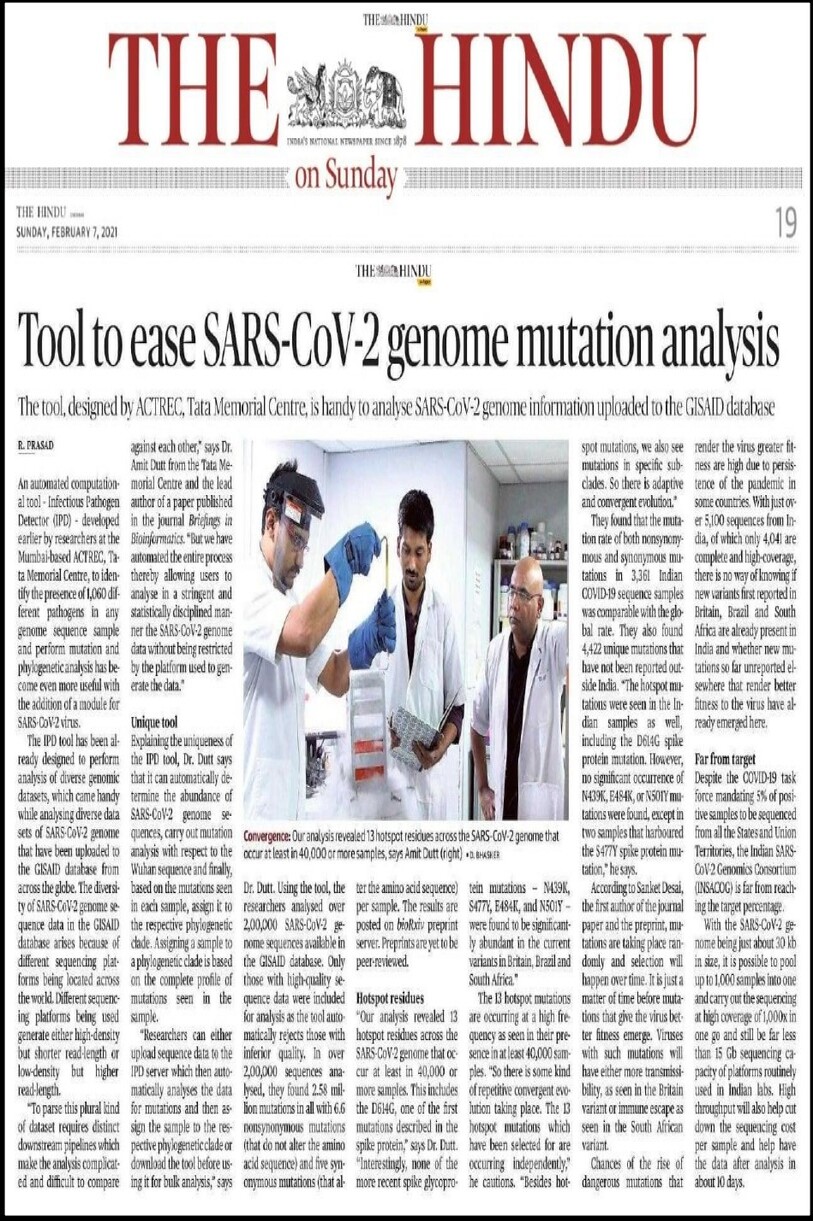 |
Tool to ease SARS-CoV-2 genome mutation analysis An automated computational tool – Infectious Pathogen Detector (IPD) – developed earlier by researchers at the Mumbai-based ACTREC, Tata Memorial Centre, to identify the presence of 1,060 different pathogens in any genome sequence sample and perform mutation and phylogenetic analysis has become even more useful with the addition of a module for SARS-CoV-2 virus. |
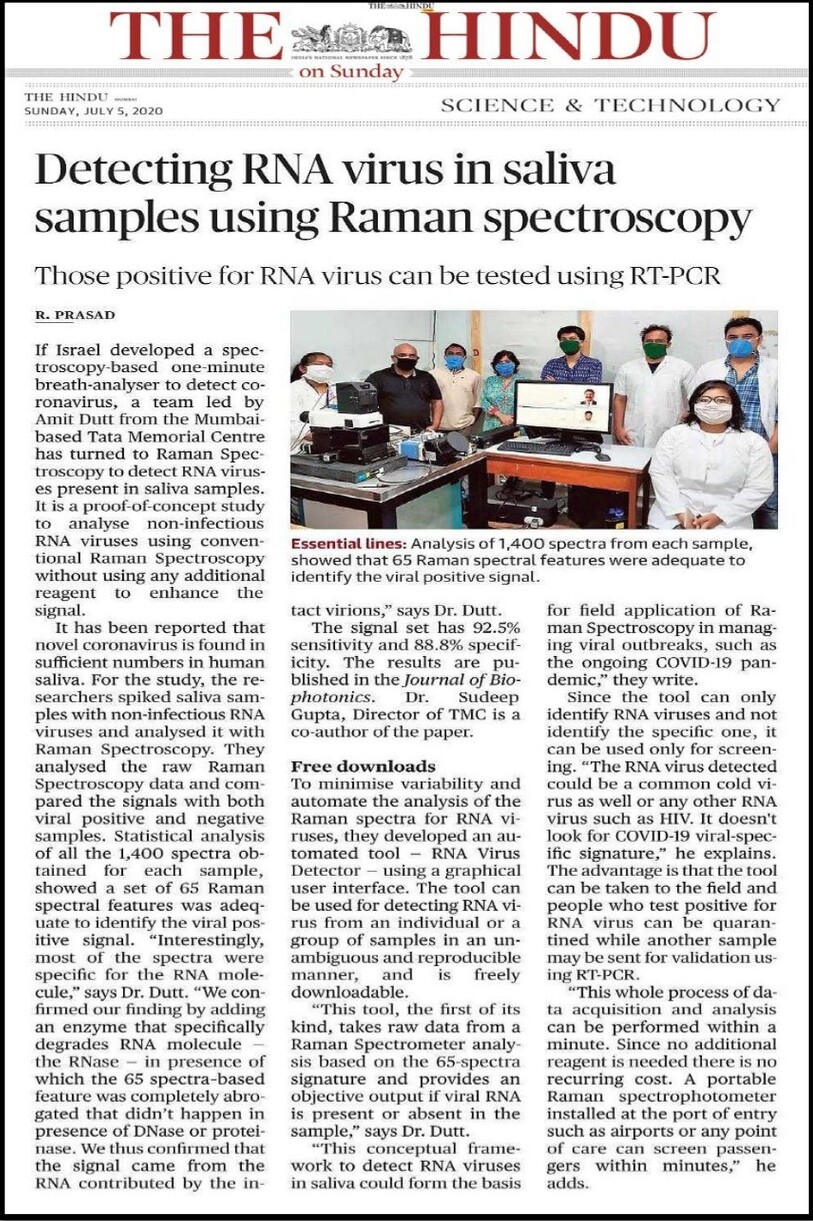 |
Detecting RNA virus in saliva samples using Raman spectroscopy If Israel developed a spectroscopy-based one-minute breath-analyser to detect coronavirus, a team led by Amit Dutt from the Mumbai-based Tata Memorial Centre has turned to Raman Spectroscopy to detect RNA viruses present in saliva samples. It is a proof-of-concept study to analyse non-infectious RNA viruses using conventional Raman Spectroscopy without using any additional reagent to enhance the signal. |
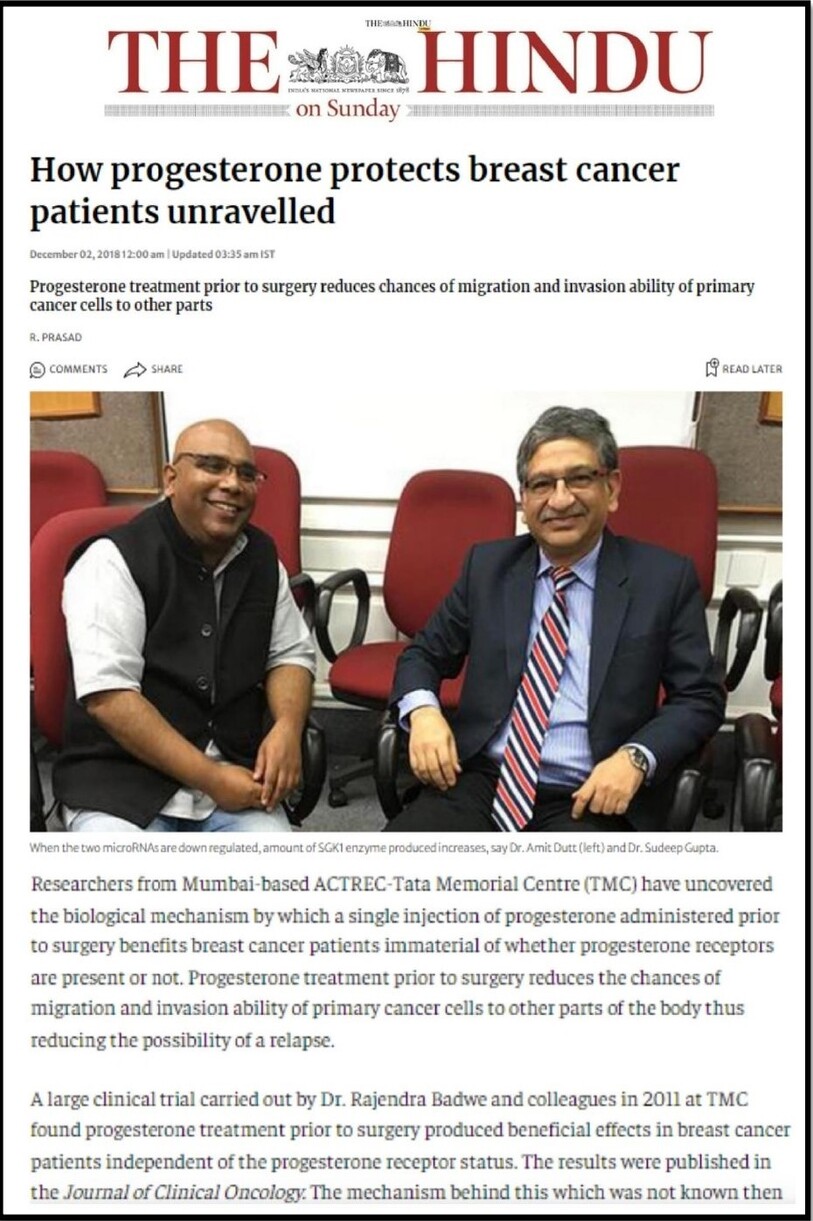 |
How progesterone protects breast cancer patients unravelled Researchers from Mumbai-based ACTREC-Tata Memorial Centre (TMC) have uncovered the biological mechanism by which a single injection of progesterone administered prior to surgery benefits breast cancer patients immaterial of whether progesterone receptors are present or not. Progesterone treatment prior to surgery reduces the chances of migration and invasion ability of primary cancer cells to other parts of the body thus reducing the possibility of a relapse. |
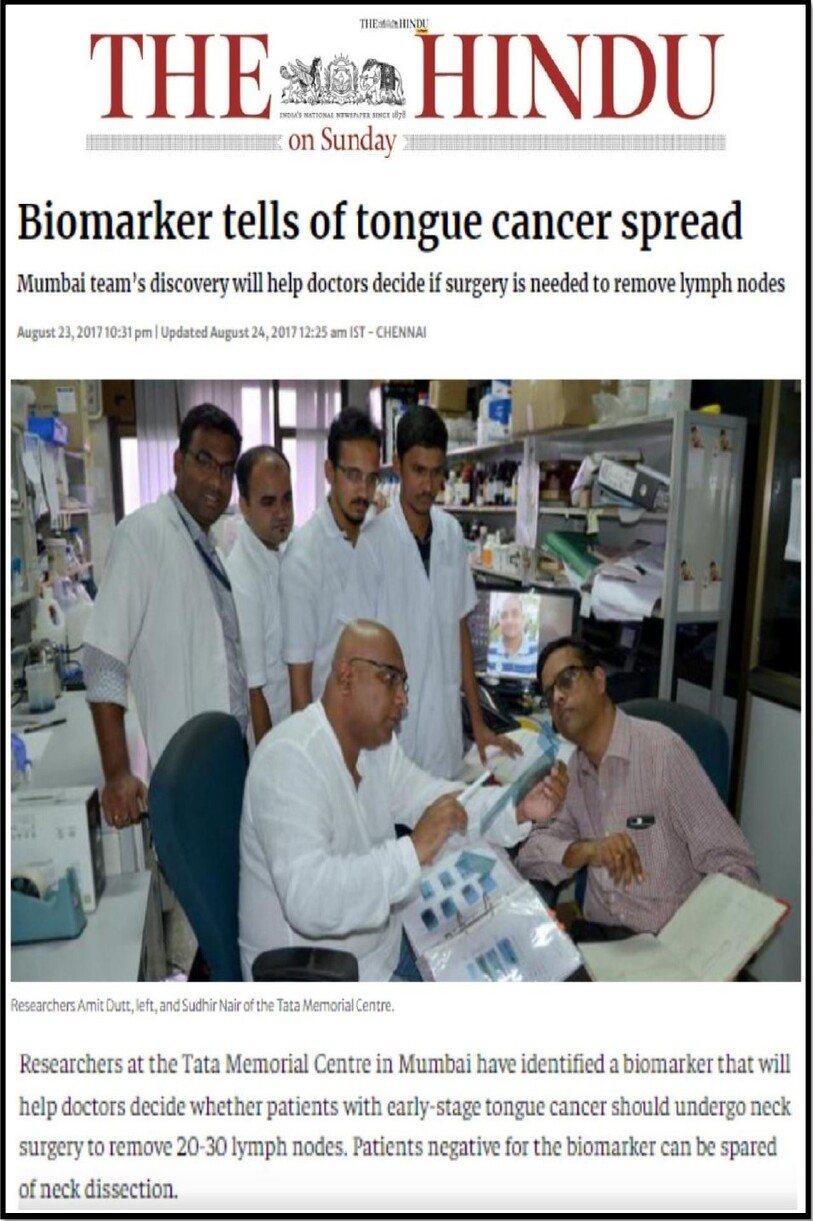 |
Biomarker tells of tongue cancer spread Researchers at the Tata Memorial Centre in Mumbai have identified a biomarker that will help doctors decide whether patients with early-stage tongue cancer should undergo neck surgery to remove 20-30 lymph nodes. Patients negative for the biomarker can be spared of neck dissection. |
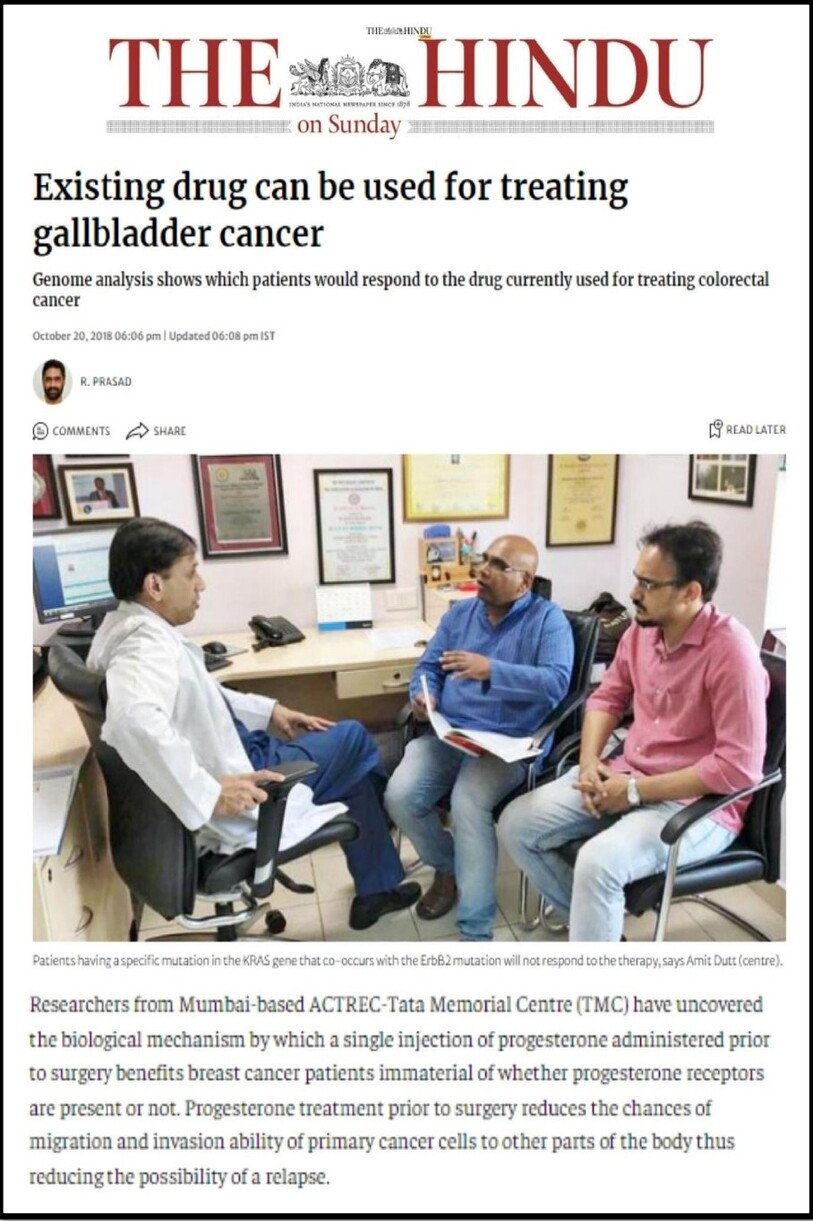 |
Existing drug can be used for treating gallbladder cancer By sequencing the whole exome of 44 early-stage gallbladder cancer samples taken from patients, researchers at Tata Memorial Centre, Mumbai, have been able to identify the mutations that cause the cancer. More importantly, based on the genomic analysis, the team has made it possible for clinicians to know in advance which gallbladder cancer patients are likely to benefit from a particular therapy that is currently being used for treating colorectal cancer. |
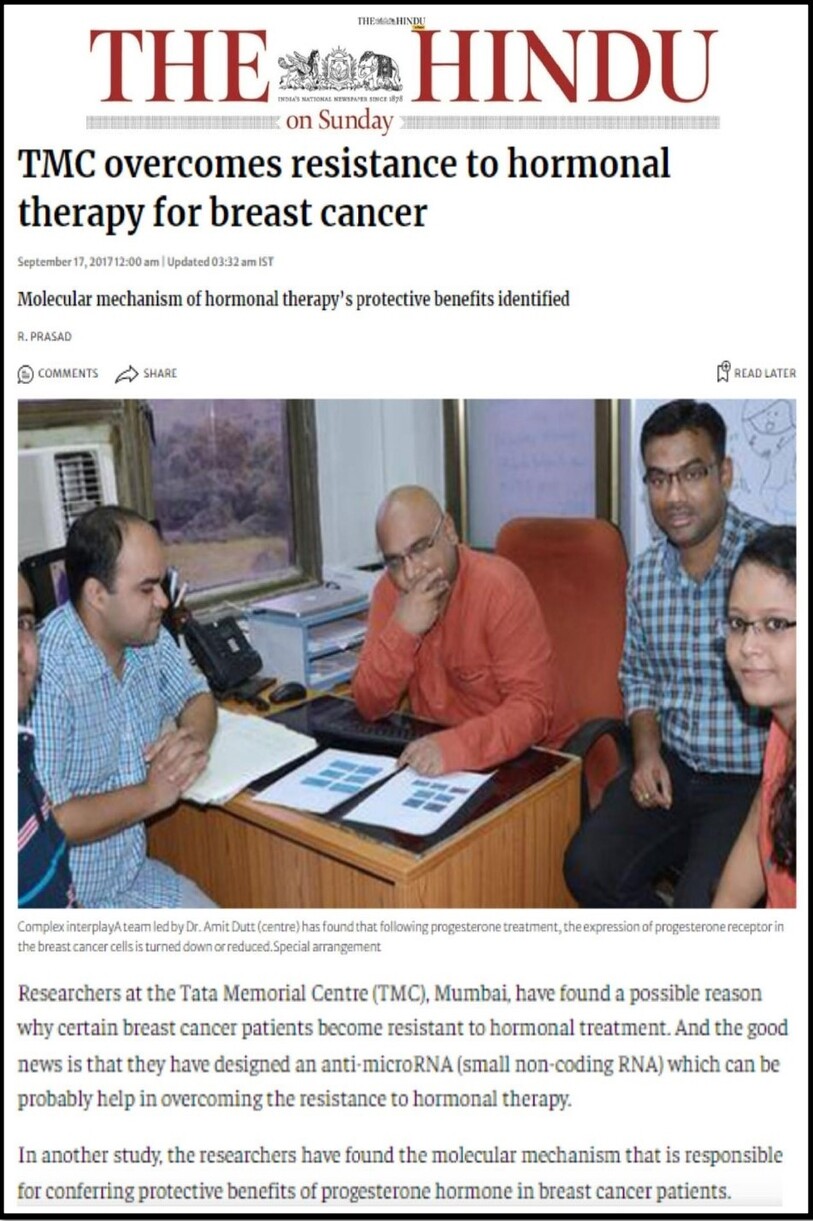 |
TMC overcomes resistance to hormonal therapy for breast cancer Researchers at the Tata Memorial Centre (TMC), Mumbai, have found a possible reason why certain breast cancer patients become resistant to hormonal treatment. And the good news is that they have designed an anti-microRNA (small non-coding RNA) which can be probably help in overcoming the resistance to hormonal therapy. In another study, the researchers have found the molecular mechanism that is responsible for conferring protective benefits of progesterone hormone in breast cancer patients. |
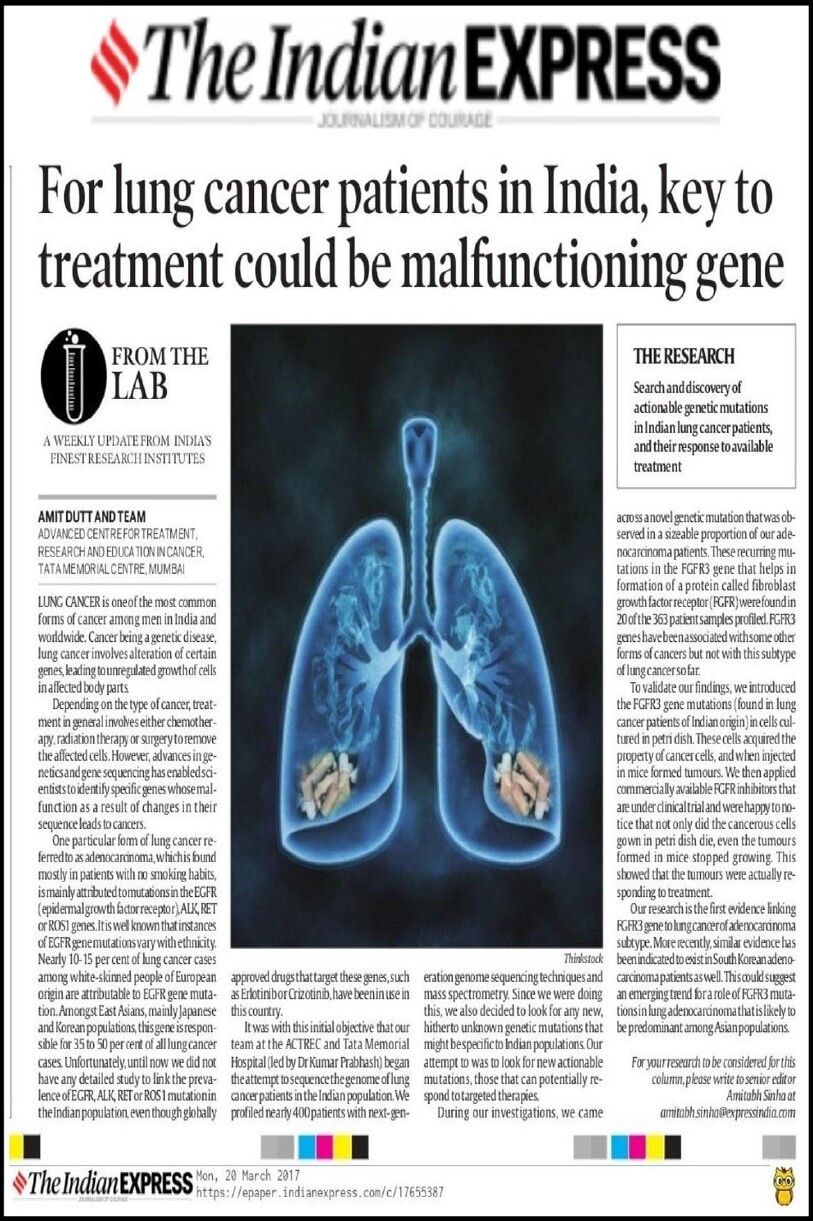 |
For lung cancer patients in India, key to treatment could be malfunctioning gene Lung cancer is onw of the most common forms of cancer among men in India and worldwide. Cancer being a genetic disease, lung cancer involves alteration of certain genes, leading to unregulated growth of cells in affected body parts. |
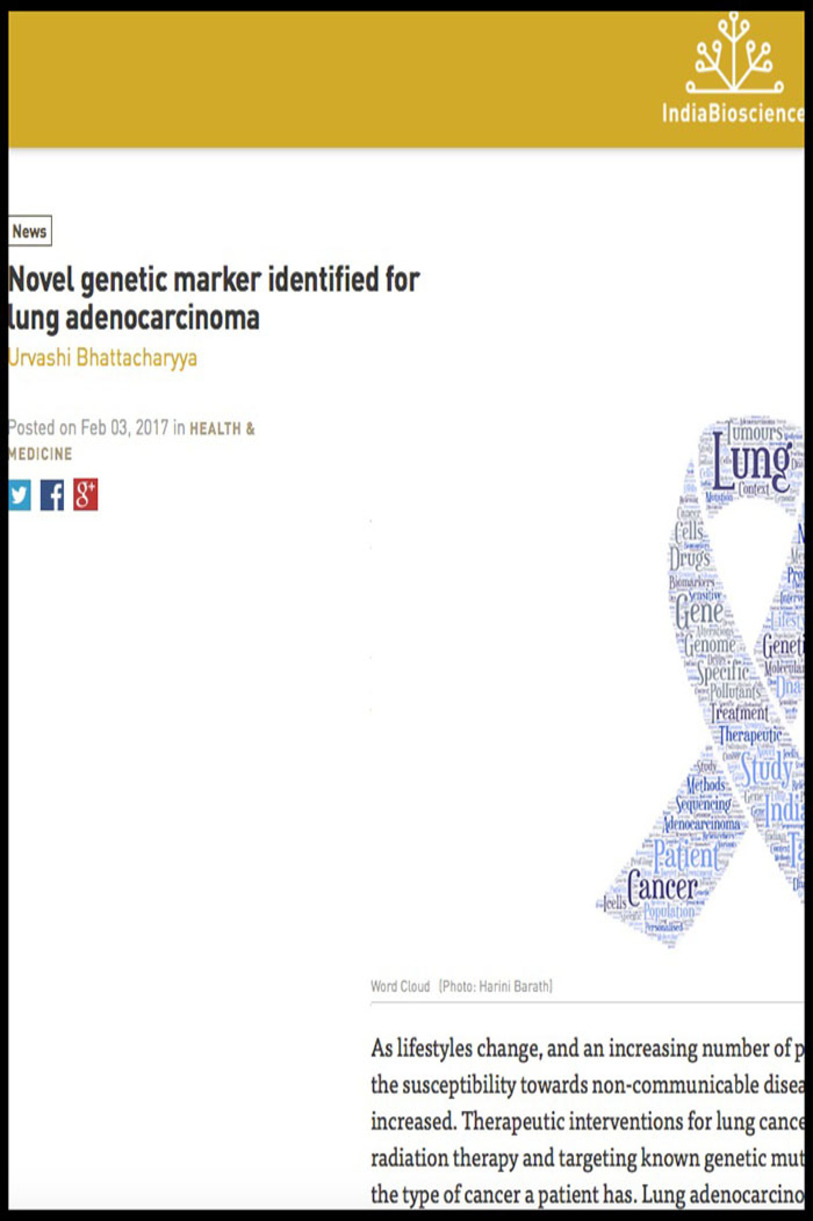 |
Novel genetic marker identified for lung adenocarcinoma As lifestyles change, and an increasing number of people get exposed to rising pollutants, the susceptibility towards non-communicable diseases like lung cancer has also increased. Therapeutic interventions for lung cancer include surgery, chemotherapy, radiation therapy and targeting known genetic mutations. |
 |
Non-typhoidal Salmonella in gallbladder cancer Gallbladder Cancer (GBC) is relatively rare compared to more common cancers of the lungs, breast, prostate and colon. However, it has emerged as a silent killer among North Indian women—the disease is usually detected only in the advanced stages when the mean survival rate for patients is around 6 months. |
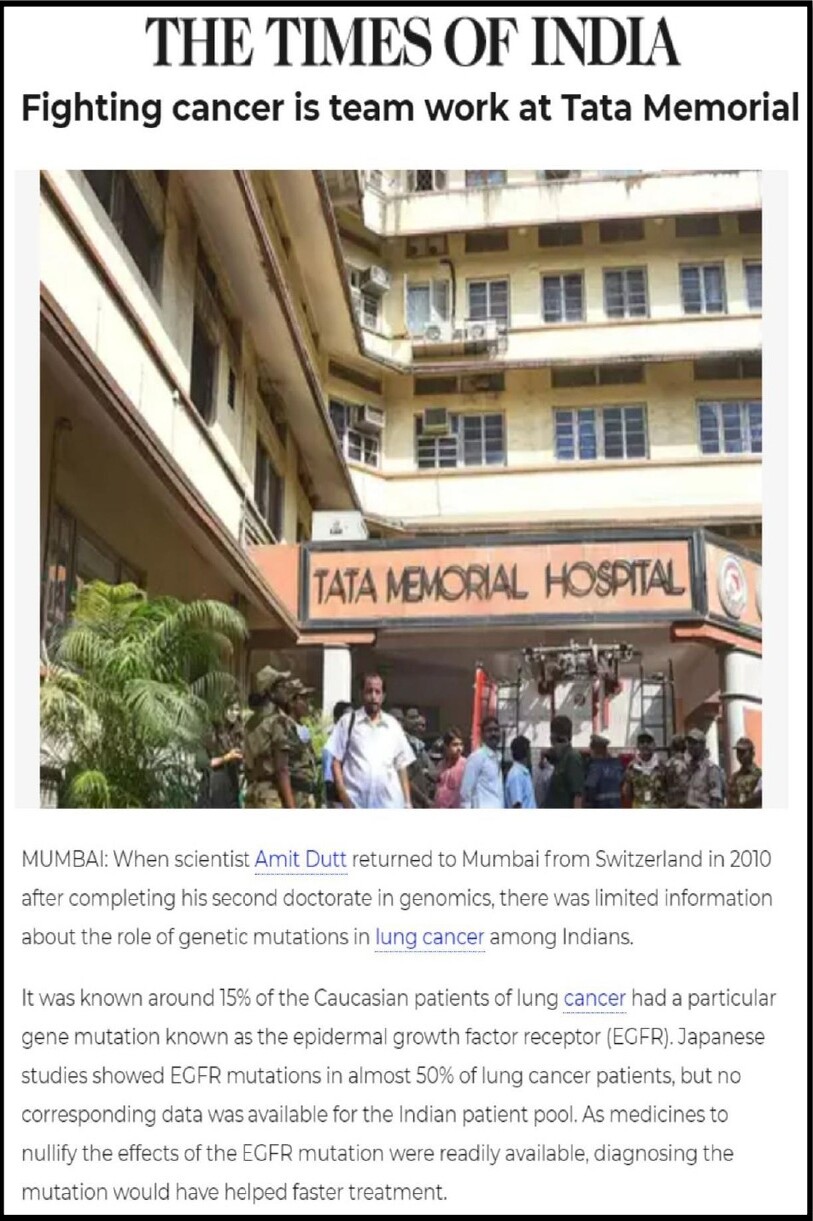 |
Fighting cancer is team work at Tata Memorial When scientist Amit Dutt returned to Mumbai from Switzerland in 2010 after completing his second doctorate in genomics, there was limited information about the role of genetic mutations in lung cancer among Indians.%0D%0AIt was known around 15% of the Caucasian patients of lung cancer had a particular gene mutation known as the epidermal growth factor receptor (EGFR). Japanese studies showed EGFR mutations in almost 50% of lung cancer patients, but no corresponding data was available for the Indian patient pool. As medicines to nullify the effects of the EGFR mutation were readily available, diagnosing the mutation would have helped faster treatment. |
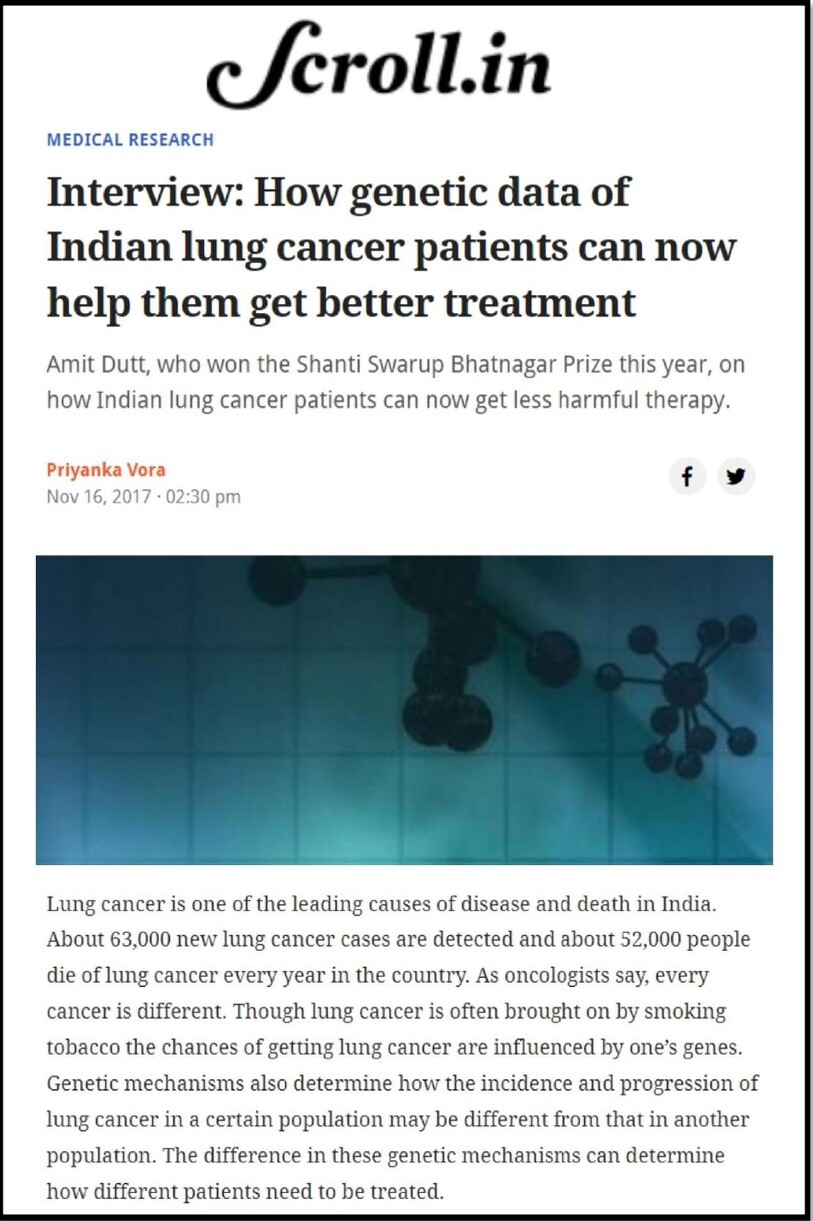 |
Interview: How genetic data of Indian lung cancer patients can now help them get better treatment Lung cancer is one of the leading causes of disease and death in India. About 63,000 new lung cancer cases are detected and about 52,000 people die of lung cancer every year in the country. As oncologists say, every cancer is different. Though lung cancer is often brought on by smoking tobacco the chances of getting lung cancer are influenced by one’s genes. Genetic mechanisms also determine how the incidence and progression of lung cancer in a certain population may be different from that in another population. The difference in these genetic mechanisms can determine how different patients need to be treated. |
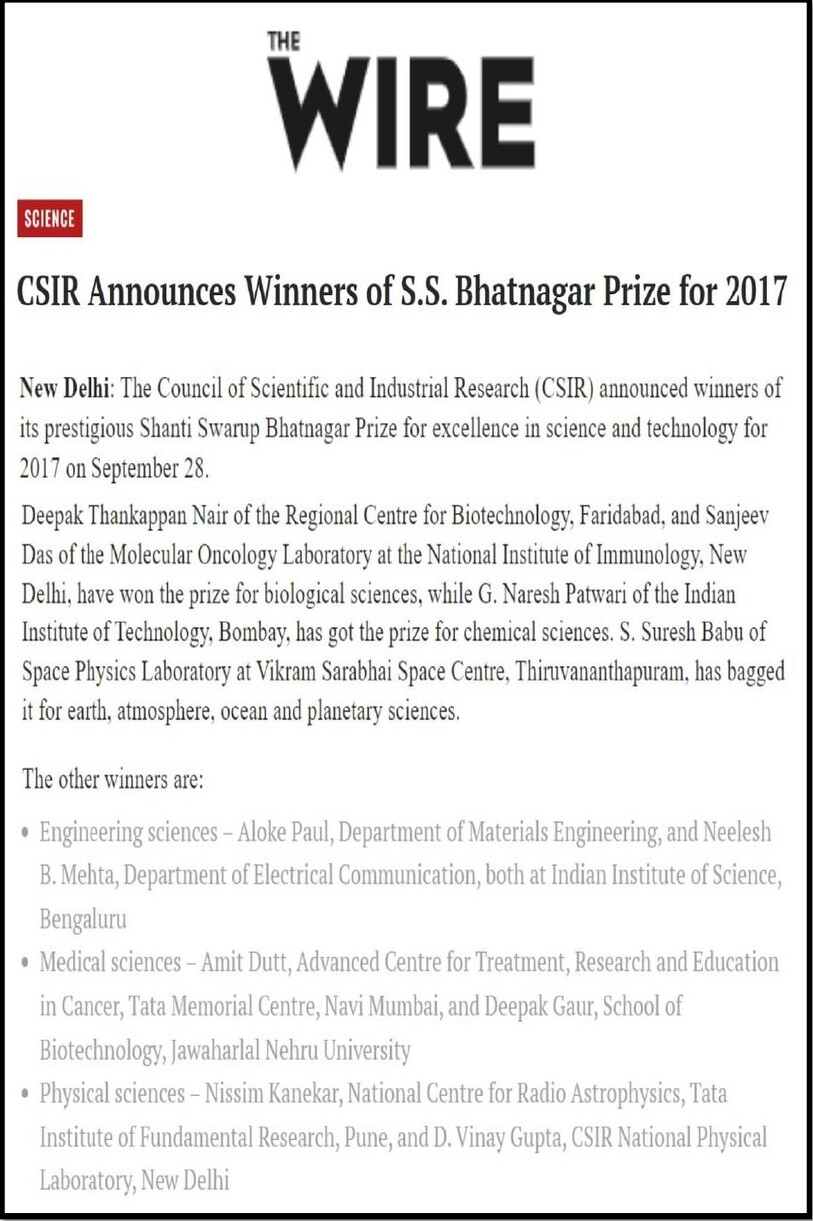 |
CSIR Announces Winners of S.S. Bhatnagar Prize for 2017 The Council of Scientific and Industrial Research (CSIR) announced winners of its prestigious Shanti Swarup Bhatnagar Prize for excellence in science and technology for 2017 on September 28.Medical sciences – Amit Dutt, Advanced Centre for Treatment, Research and Education in Cancer, Tata Memorial Centre, Navi Mumbai, and Deepak Gaur, School of Biotechnology, Jawaharlal Nehru University |
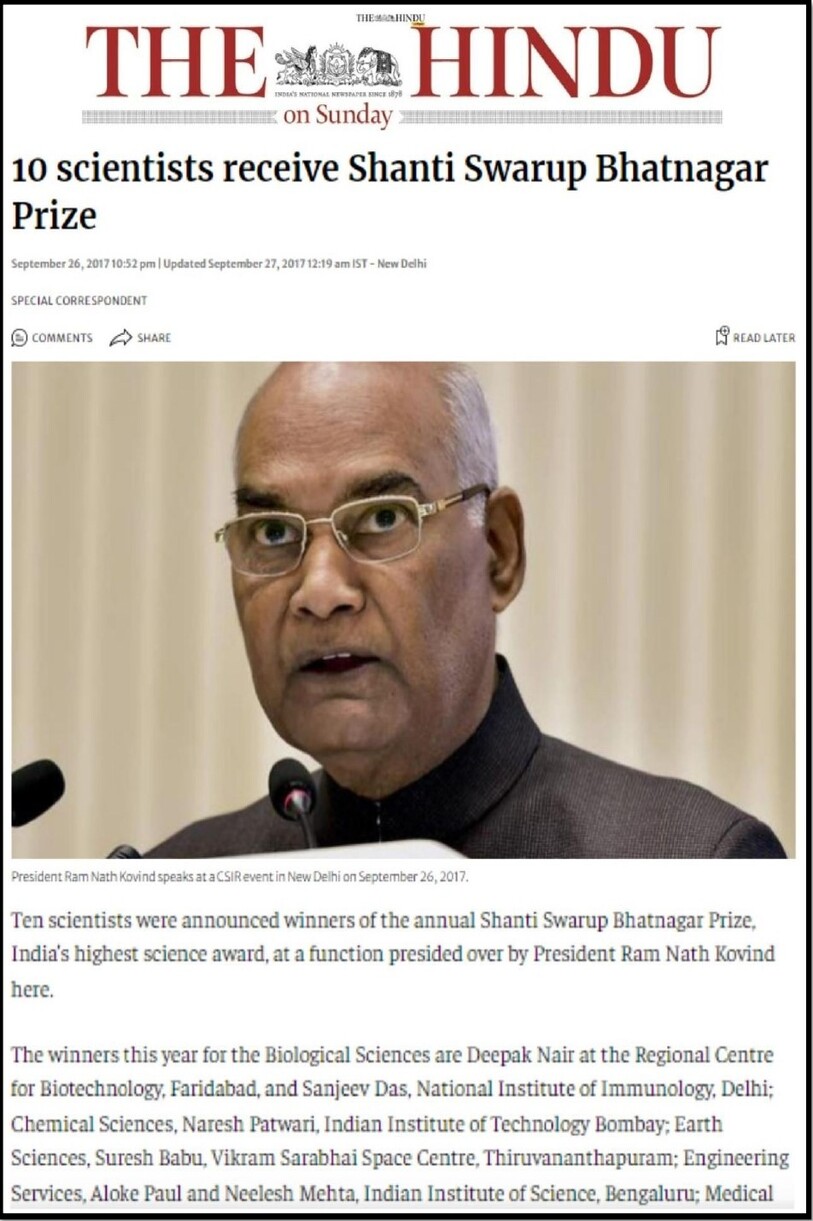 |
10 scientists receive Shanti Swarup Bhatnagar Prize Ten scientists were announced winners of the annual Shanti Swarup Bhatnagar Prize, India’s highest science award, at a function presided over by President Ram Nath Kovind here. The winners this year for the Biological Sciences are Deepak Nair at the Regional Centre for Biotechnology, Faridabad, and Sanjeev Das, National Institute of Immunology, Delhi; Chemical Sciences, Naresh Patwari, Indian Institute of Technology Bombay; Earth Sciences, Suresh Babu, Vikram Sarabhai Space Centre, Thiruvananthapuram; Engineering Services, Aloke Paul and Neelesh Mehta, Indian Institute of Science, Bengaluru; Medical Sciences, Amit Dutt, Tata Memorial Centre, Mumbai |
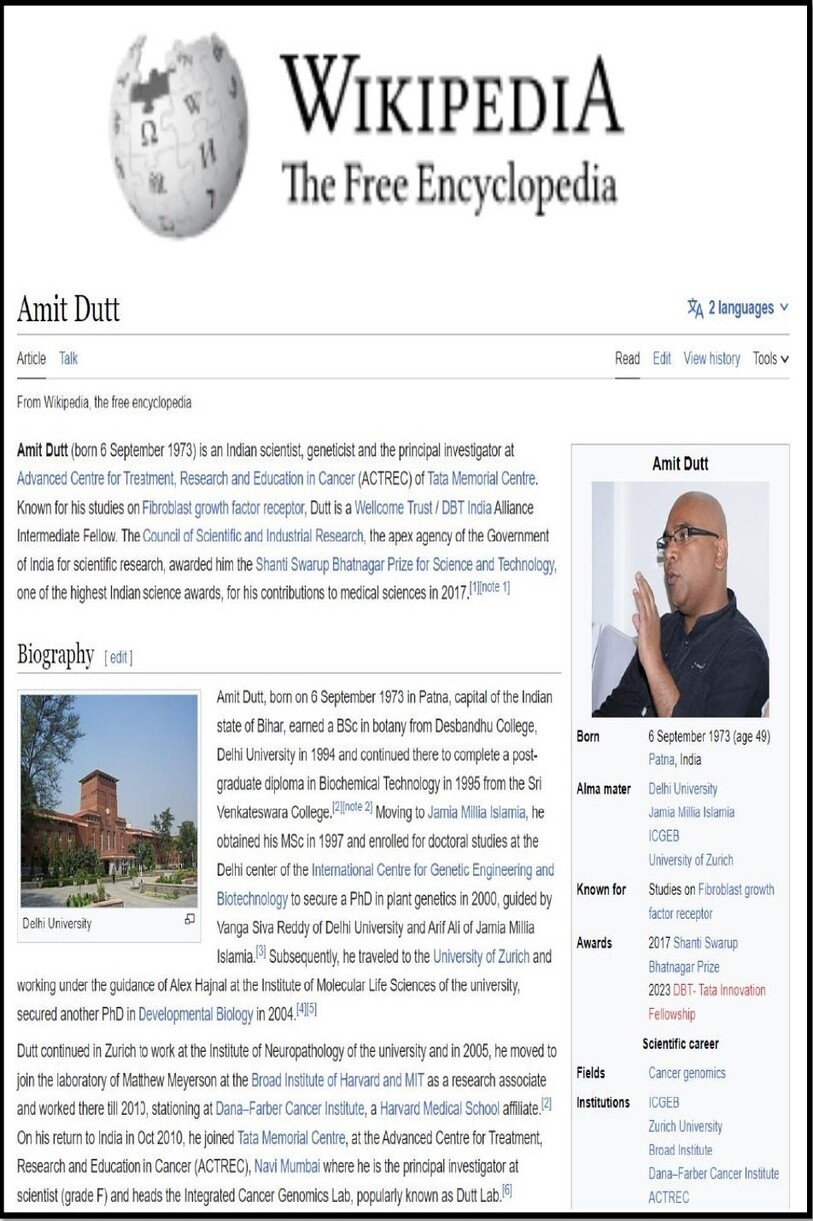 |
Wikipedia page of Dr. Amit Dutt Amit Dutt (born 6 September 1973) is an Indian scientist, geneticist and the principal investigator at Advanced Centre for Treatment, Research and Education in Cancer (ACTREC) of Tata Memorial Centre. Known for his studies on Fibroblast growth factor receptor, Dutt is a Wellcome Trust / DBT India Alliance Intermediate Fellow. The Council of Scientific and Industrial Research, the apex agency of the Government of India for scientific research, awarded him the Shanti Swarup Bhatnagar Prize for Science and Technology, one of the highest Indian science awards, for his contributions to medical sciences in 2017. |
 |
Dutt lab on Science Radio by IISER Pune |